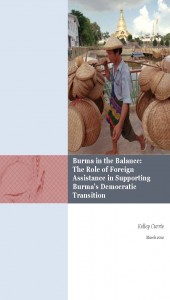Burma in the Balance: The Role of Foreign Assistance in Supporting Burma’s Democratic Transition
By Kelley Currie for the Project 2049 Institute • March 22, 2012 The historic constraints on donor interventions in Burma—whether self-imposed sanctions or regime-imposed barriers—are increasingly giving way to a sense of heightened optimism about the possibilities of working on issues across the development spectrum. But while the terrain appears to be improving, there remain substantial barriers to effective programming beyond the overall pace and scope of political reform. Overall, Burma presents particular challenges and historic opportunities to put into practice a balanced approach that advances political and economic reforms alongside each other in a mutually reinforcing, and ultimately more sustainable, manner.
The historic constraints on donor interventions in Burma—whether self-imposed sanctions or regime-imposed barriers—are increasingly giving way to a sense of heightened optimism about the possibilities of working on issues across the development spectrum. But while the terrain appears to be improving, there remain substantial barriers to effective programming beyond the overall pace and scope of political reform. Overall, Burma presents particular challenges and historic opportunities to put into practice a balanced approach that advances political and economic reforms alongside each other in a mutually reinforcing, and ultimately more sustainable, manner.
Through the analysis and recommendations developed in this report, Project 2049 hopes to provide the donor community some reference points as it seeks to develop responsible interventions in a unique and important context. The report identifies a number of key trends and issues:
- Burma remains a highly contested political environment on multiple levels, featuring sharp disparities in and disconnects between legitimacy, authority and control. The struggle for political legitimacy in Burma has been made more fluid by the simultaneous political and economic transitions that appear to be underway.
- The government is both a development actor and a party to various conflicts, creating the potential for state-building, development and peace-building objectives to come into conflict. Donors’ and aid agencies’ pent-up demand to work with the authorities presents a danger that development goals will become conflated with the political objectives of governing authorities.
- Transparency, accountability and consultation are key pillars for both successful economic development and the building of a healthy political culture. Development cannot be a substitute for resolving political conflicts, but poverty alleviation strategies should be linked to conflict prevention efforts.
- Ethnic communities will strongly resist any development agenda based solely or even primarily on an elite Burman consensus, and are wary of efforts to substitute economic development for resolution of political issues. There is a worry that donors’ development agendas could lead them to unintentionally support policies in ethnic areas that could reignite conflict.
- The present chaotic policy environment of ‘competitive reformism’ is not producing quality legislation or a focus on strategic priorities. Donor behavior can either add to the sense of frenzy or serve as a helpful brake. Existing coordination mechanisms have been effective but the danger of uncoordinated donor interventions overwhelming the system is very real.
- While there are major capacity gaps, particularly on the governance side, there is also substantial unrealized potential within Burmese society that just needs a more favorable environment and targeted support to flourish.
- There is a need for donors to begin talking about security sector reform and transitional justice issues in Burma. While some donors may think it premature, delays in dealing with these issues will be harmful to both democratic and economic development.
- Refugee and cross border assistance continues to be vital to many communities that remain inaccessible from within the country. Efforts to press for rapid return and resettlement of displaced populations are not only unrealistic, but risk renewed conflict.
In light of these findings, Project 2049 issues recommendations for OECD donors and aid agencies working in Burma as well as specific recommendations for donors.
Download the full report here.
Tags: Development Aid, Donors, Humanitarian Assistance, Kelley Currie, Project 2049 InstituteThis post is in: Aid, Economy, Environmental and Economic Justice, Spotlight
Related PostsForeign Office Minister Hugo Swire Visits Burma’s Rakhine State
At Your Own Risk: Reprisals against Critics of World Bank Financed Projects
Burma: Japanese Leader’s Visit Should Highlight Rights
Too Much, Too Soon? The Dilemma of Foreign Aid to Myanmar/Burma
World Bank Breaches Own Policy and Ignores Civil Society’s Request for Postponement of Project









 All posts
All posts